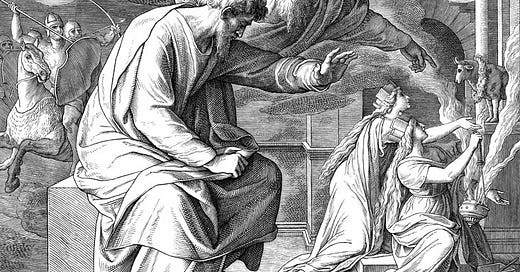In the first reading, Jeremiah hears God’s call, and is afraid of the trials he will face. The Psalm, by contrast, shows confidence in God, because of the trials he’s faced.
Jesus shows us that the troubles in our life are not necessarily bad things, in the end.
Reading 1
Jer 1:1, 4-10
The words of Jeremiah, son of Hilkiah, of a priestly family in Anathoth, in the land of Benjamin.
The word of the LORD came to me thus:
Before I formed you in the womb I knew you, before you were born I dedicated you, a prophet to the nations I appointed you. “Ah, Lord GOD!” I said, "I know not how to speak; I am too young.”
But the LORD answered me, Say not, “I am too young.” To whomever I send you, you shall go; whatever I command you, you shall speak. Have no fear before them, because I am with you to deliver you, says the LORD.
Then the LORD extended his hand and touched my mouth, saying, See, I place my words in your mouth! This day I set you over nations and over kingdoms, To root up and to tear down, to destroy and to demolish, to build and to plant.
Jeremiah wasn’t ready for God’s call. But God was ready for him.
Instead of saying no, we should trust that God’s plan involves guiding us as well as calling us, as He does with Jeremiah.
Responsorial Psalm
Ps 71:1-2, 3-4a, 5-6ab, 15 and 17
R. (see 15ab) I will sing of your salvation.
In you, O LORD, I take refuge;
let me never be put to shame.
In your justice rescue me, and deliver me;
incline your ear to me, and save me.
R. I will sing of your salvation.
Be my rock of refuge,
a stronghold to give me safety,
for you are my rock and my fortress.
O my God, rescue me from the hand of the wicked.
R. I will sing of your salvation.
For you are my hope, O Lord;
my trust, O God, from my youth.
On you I depend from birth;
from my mother’s womb you are my strength.
R. I will sing of your salvation.
My mouth shall declare your justice,
day by day your salvation.
O God, you have taught me from my youth,
and till the present I proclaim your wondrous deeds.
R. I will sing of your salvation.
In contrast to the passage from Jeremiah, this psalm is from an old man. At the end of his life, he sees how God’s plan has worked out for him. It wasn’t all smooth; in fact, he appears to be under attack from the wicked. But the psalmist’s life experience gives him faith that God will still come to his aid in the end.
Alleluia
R. Alleluia, alleluia.
The seed is the word of God, Christ is the sower;
All who come to him will live for ever.
R. Alleluia, alleluia.
I’ve argued that Christ is not the sower but the seed, given the context of this particular parable. But what do I know?
Gospel
Mt 13:1-9
On that day, Jesus went out of the house and sat down by the sea. Such large crowds gathered around him that he got into a boat and sat down, and the whole crowd stood along the shore. And he spoke to them at length in parables, saying: "A sower went out to sow. And as he sowed, some seed fell on the path, and birds came and ate it up. Some fell on rocky ground, where it had little soil. It sprang up at once because the soil was not deep, and when the sun rose it was scorched, and it withered for lack of roots. Some seed fell among thorns, and the thorns grew up and choked it. But some seed fell on rich soil, and produced fruit, a hundred or sixty or thirtyfold. Whoever has ears ought to hear."
In ancient Palestine, farmers often sowed seeds before plowing. So the sower isn’t being wasteful; he’s just planting before the earth has been turned over.
The advantage of this (as far as my city-slicker understanding goes) is that the seeds which are in good ground get pushed deeper by the plow which allows the plants to grow even larger.
The trials and tribulations we go through often make us come out even more blessed and fruitful on the other side.



